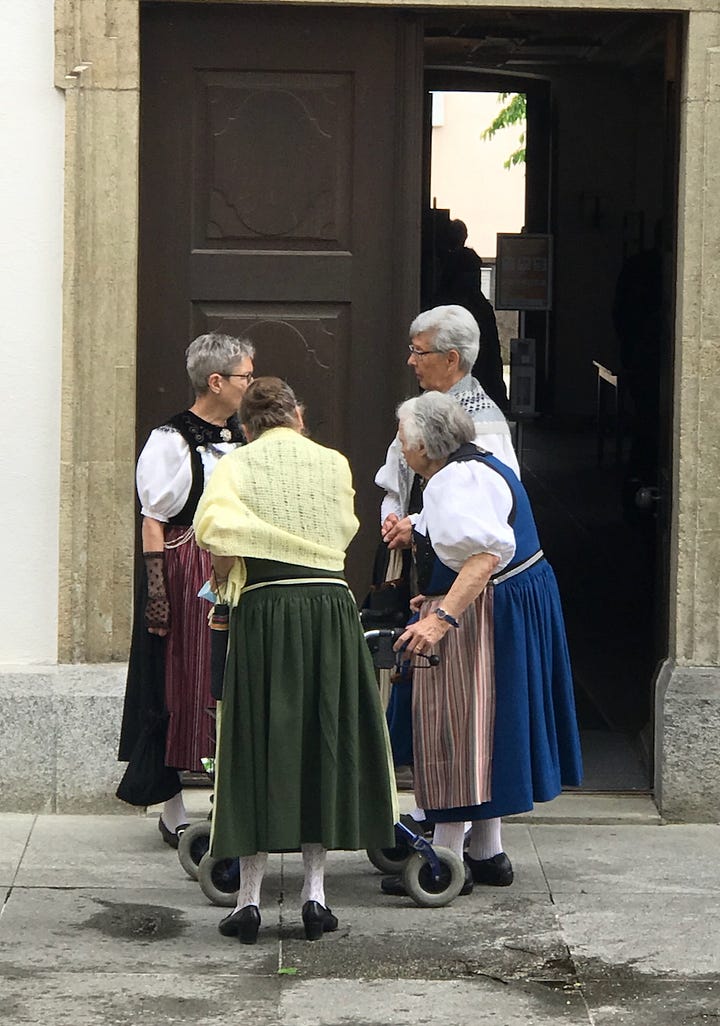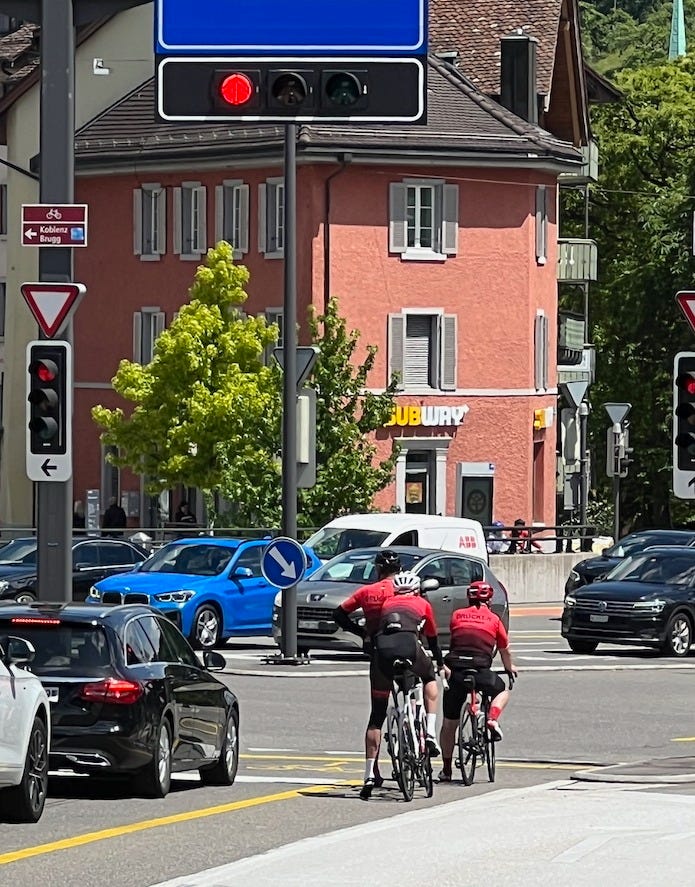Twelve (12) things I've learned about Swiss (German) life
Inspired by Debora Robertson in France and Lucy Pepper in Portugal
Two very perceptive and funny writers in two near-ish countries put together lists of societal observations recently. Debora Robertson (whom I did not “know” in the substackian way, but do now) unleashed her anthropological study of interactions in southern France, which inspired Lucy Pepper to counter with the corresponding points for Portugal (Ribatejo, so the other side of the river from Lisbon). In an international chain reaction, this got me thinking of the equivalent moments in Switzerland.
Always say grüezi. Always greet people you encounter when walking down the street, on a footpath, hiking up a mountain. If it is a single person, grüezi is fine (a smile is very optional, they might think you’re weird) but to a pair or a group add the collective miteinand.
Pro tip: do not say grüezi miteinand to a man walking his dog, or a woman on a horse. They will think you are very weird indeed.
But don’t go overboard with the niceties. Once your grüezi has been placed, that is correct and quite enough thank you. Small talking is reserved for acquaintances, like neighbors or co-workers or people you know have lived in your village the same number of generations as your family has.
It struck me in German-speaking Switzerland that linguistically, one does not have friends. One has Kollegen (colleagues). Freund / Freundin (friend) is reserved for a romantic relationship. In Germany or Austria, I can meet up with a male friend, mich mit einem Freund treffen, and no one thinks anything of it. In Switzerland, that would be my boyfriend or lover. I find it telling that here my closest, best friend– the one for hugs and getting drunk and laughing and crying over stupid things– is called meine beste Kollegin. Aside from that sounding like the office outperformer, it describes a distance in that most vital of relationships. Which fits the culture, actually.
In German-speaking Switzerland, speziell is not a compliment. Saying that a situation or a comment or a person is “special” is the Swiss German’s charmingly indirect way of saying uncomfortable (situation), tasteless, totally out of line (comment), or difficult and even bizarre (person). What English speakers might consider eccentric or even loveable is speziell. This pronouncement is often delivered with a knowing pause preceding the word: Die Meier Regula ist eine ganz Nette, aber (pause) speziell.
Zebra crossings are an exercise in Helvetic consensus for drivers and pedestrians alike. Drivers are not required to stop, but the sight of persons hovering at the edge of a zebra crossing will make many drivers slow down and attempt to make eye contact with the pedestrians. If those on the trottoir do not establish eye contact with you, feel free to drive on. Clusters of cappuccino mamis and their small fry on trottis are known to block zebra crossing entrances for ages while they gossip, causing legitimate street crossers to get grumpy at being unable to signal to motorized traffic that they do, in fact, desire to cross.1
The real danger is cyclists. Whether MAMILs2, food delivery persons, early retirees on their e-mountain bikes, or self-righteous city environmentalists – all whiz through zebra crossings with neither a glance nor a movement toward the brakes. They’re not cars, after all. They are not about to risk downshifting to let anyone schlep across the street, and they will heartily curse you if you attempt to do so. The current plague of e-trottis is the worst: fast, silent, and unbound by either the rules of the street or of the trottoir, they hop and weave without any warning.With all the handshaking and cheek-kissing, the bonjouring, bonsoiring and aurevoiring, it can take longer to arrive at and leave a party than you spend at a party. For a people with notable aversion to emotion or intimacy, Swiss German party behavior always seems like a parody of something they’ve seen in a French film. Three kisses. Always pantomimed in a very large way, which can be dizzying at a party when one is forced to do the three-times-cheek-to-cheek motion a dozen times in a row.
Depending on the size, crowdedness, and formality of a gathering, it is permissable to not greet every single person individually. Departures, however, require the entire round– even if you are saying goodbye to someone you did not actually greet. An appropriate remark oh, haben wir uns schon gesehen? nee? and then an introduction before leaving is perfectly fine. Who knows, you might end up staying longer. In that case, one begins the farewell round anew. jaja ich weiss, bin noch da, jetzt aber gehe ich, wirklich
In the early years of the 21st century, I was still a recently-arrived guest worker on the hamster wheel of corporate Switzerland. My co-workers used to snicker at me for insisting on handshakes. Hey, at least I smiled. I never really got used to the notion of air-kissing banking executives.3
Why do I want to get that close to someone I barely know (and might prefer not to know)? To my great relief, this pseudo-friendliness vanished in the pandemic years. The three kisses have made a comeback, but people now hesitate to see if their victim is prepared. No more of these swooping attack maneuvers. Bleh.
Going to some friends for drinks or dinner? If it’s a proper old-school household, no one gets a drink before everyone is there. Sometimes people are late, le quart d’heure de politesse and all that. Um, no. There is no such thing as the academic quarter hour, and I know because I have tried to argue this point for two decades. If you arrive five minutes before the invited time, you are cutting it uncomfortably close. Twenty minutes late, you better have called with a really good excuse, like your train caught fire or there was a five-car pile-up on the Autobahn. “Traffic” alone does not cut it; you are supposed to figure that in. If you are more than half an hour late, there must have been an unexpected death or dismemberment involved. An hour? Don’t bother showing up, call your hosts with profuse apologies, send flowers the next day– but don’t expect to ever be invited again.
Arriving 15-20 minutes early is acceptable. As the host, one must take this into account and not be still dashing about in one’s underwear. Drinks are offered to arrivals immediately; there is no waiting until all are assembled. Perhaps this is what leads to outbreaks of bonhomie at Swiss parties. Food, whether apéro, buffet, or sit-down dinner, is never offered until all guests are present.



Party people, Swiss (German) style. (photos: C. Smrstik) bon appétit. En guete! This blessing is required before eating. It also serves as the not-very-subtle signal from the hostess-host that consumption of food is now allowed. Correctly, the hostess-host wishes en guete mitanand! collectively, to which guests reply nodding at each other en guete, kind of like the Amen.
Very cold water is bad for your digestion. When eating cheese dishes, this is absolutely true. Fondue and Raclette require warm tea, or white wine (may be chilled, because the acid compensates). Otherwise the cheese will form a giant hard ball in your stomach which could be lethal. For non-cheese meals, there is a very clear delineation between still water and carbonated water, both of which are called mineral regardless of whether they actually contain minerals. You may specify chilled or room temperature. Ice cubes are a serious no-no.
In the department of temperature control, draughts also kill in this part of the world. Es zieht is a common complaint, and bad luck for you if you prefer a breath of fresh air in any room.Bread, butter, or both? In a Swiss German restaurant, a basket of bread will usually be brought to your table, with no special care or love for its contents. Often the slices are wrapped in plastic in an attempt to seem fresh? hygienic? Appealing, it is not. Swiss bread is generally awful, remaining fresh for up to 45 minutes after baking. In the cities there are now artisanal bakers using whole grains, sourdough, various types of flour and this is an improvement. But here we find neither “good German bread” nor proper French bread, which remains a mystery to me. Butter is never supplied.4 This is bread to chew on in desperation, or to use in one hand to assist in pushing salad onto your fork, or to be eaten with soup. Saucer, comme en France? No, not done.
In fine dining restaurants, or those with aspirations, the bread is often house-baked and better quality, and served with a house accompaniment, such as olive oil from someone’s uncle’s place in Tuscany, or our own quark with hemp seeds, or whipped curry vegan “butter.” If it is a fine dining resto outside the city, there may be real butter in minute amounts from Hansueli’s organic farm.
It is acceptable, barely, to request more bread. It is not acceptable to request more butter-oil-quark.
If you want your coffee to be served with your dessert (pronounced DAY-zer) you’re going to have to ask. You may get a strange look from your server. You will not receive your coffee with your dessert, or before your dessert. Coffee is after dessert, period. Taking coffee or tea is a signal that the incredibly stressful work of your server is finished and they are now free to ignore you and turn their attention to other guests, or to cleaning up the restaurant. Or to their Insta feed or Tik-Tok. Despite the fame of Swiss hotellerie schools, César Ritz, etc., this is not a service culture. Historically, the Swiss resisted bowing down to the bourgeouisie (who were foreign imports anyway): read Schiller’s Wilhelm Tell. Switzerland had no royals or noble elite; even in the 21st century, it’s still a proud peasant culture at heart, and still extremely suspicious of outsiders.
You’d be very unlucky if a waiter harasses you to pay. The other way around: you have to harass the waiter in order to pay. Spouse and I learned the hard way, many, many times, that “dinner and a movie” is not feasible here. You can do one, or the other. If you are in a hurry to make a film screening at 20.15, you can try to book a dinner table at 18.00 but it’s really poor manners to rush the restaurant staff. They will make you late if they can. And then everyone at the kino will be mean to you if you arrive during the previews or ads.
And finally, if you’re a grown person in control of your faculties, it’s poor form to eat except at mealtimes. Mealtimes are strictly regulated. When my boy was in school, we were required to supply snacks, and received pictogram-illustrated letters from the school about what is permitted for a znüni (snack at 9) and a zvieri (afternoon snack, despite the name not at 4 but usually around 3).
Adults tend to stick to their school schedule. Breakfast between 7 and 8, znüni (coffee break, usually kafi und gipfeli5) between 9 and 10, lunch federally mandated between 12 and 2 pm. Zvieri (more coffee, and chocolate) between 3 and 4. Dinner between 7 and 8. If you have evening commitments (sport training, music practice, village meetings, club activities, Something Social), a hardy zvieri (Birchermüesli, sandwich) is an acceptable meal.
If your digestive system requires something else (as mine does, making me instantly stand out as Not Really Swiss), it is a struggle.
Regarding crisps (chips for US English speakers, or pommeschips in Swiss German, I kid you not), these are only acceptable as Party Food. Never a snack, never part of a meal.
Yet shops sell individual bags, even though these are verboten as part of a kid’s znüni or zvieri. Makes one wonder for whom they are intended. Addicts, perhaps, who need a fix. Switzerland is quite understanding in that way.
Well. There we have it. Thanks for the writing prompt, ladies. Debora included a lovely recipe for Rillettes de maquereaux, which I intend to make the next time my fish guy has fresh mackerel. And Lucy punctuated her list with one of her drawings, which I adore. I have no such treasures to offer, alas. But you can enjoy my horse being his goofy self in this wee film.
The trottinette, mentioned by my colleagues in Portugal and France, is here diminished to trotti.
Middle-Aged Men In Lycra. You know the ones I mean, kitted up like they’re in training for the next Tour de France.
Even worse were the apéro-duzis. This is the phenomenon by which two persons of unequal rank go from Siezen to duzen (the formal address to the intimate, vousvoyer to tutoyer) in the course of an office apéro. As the wine bottles empty, the distance shortens, first names only and before you know it, everyone and his brother is doing the three kisses thing saying their goodbyes. The next day in the office, no one is really sure if they are now duzis or not. Tricky.
This is made more complex by the natural Swiss tendency to go for the du as quickly as possible. Because we’re all just regular folk and no one wants to be the Gessler. I intentionally tortured one annoying colleague for years by always calling him Herr Schmidt (Sie) when the rest were du. This meant he was required to call me Frau Smrstik. I was that cruel. When I finally offered him the du after about five years slaving away at the same financial giant, he nearly broke down and cried.
It’s too expensive. You’d think we have more than enough dairy cattle to keep the price of butter moderate. But all those happy cows chewing their cud contentedly in herb-filled Alpine pastures are highly subsidized landscape decoration. The political power of the farmers’ lobby in Switzerland is what will prevent us from ever joining the European Union: we’d have to lower our farming subsidies.
Coffee and a crescent-shaped, flaky bread object that is most emphatically not a croissant.









Wonderful! German Switzerland sounds as bonkers as Portugal but kind of the opposite in every way! :))